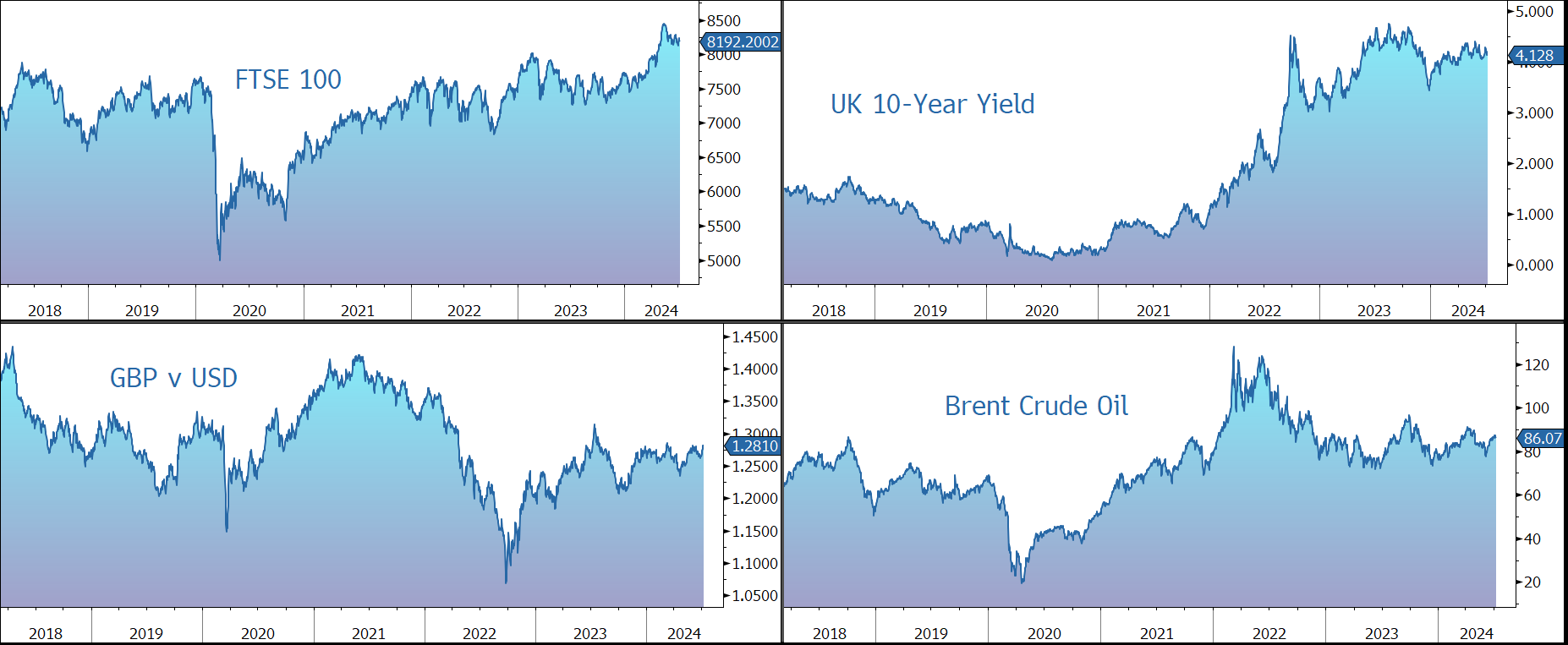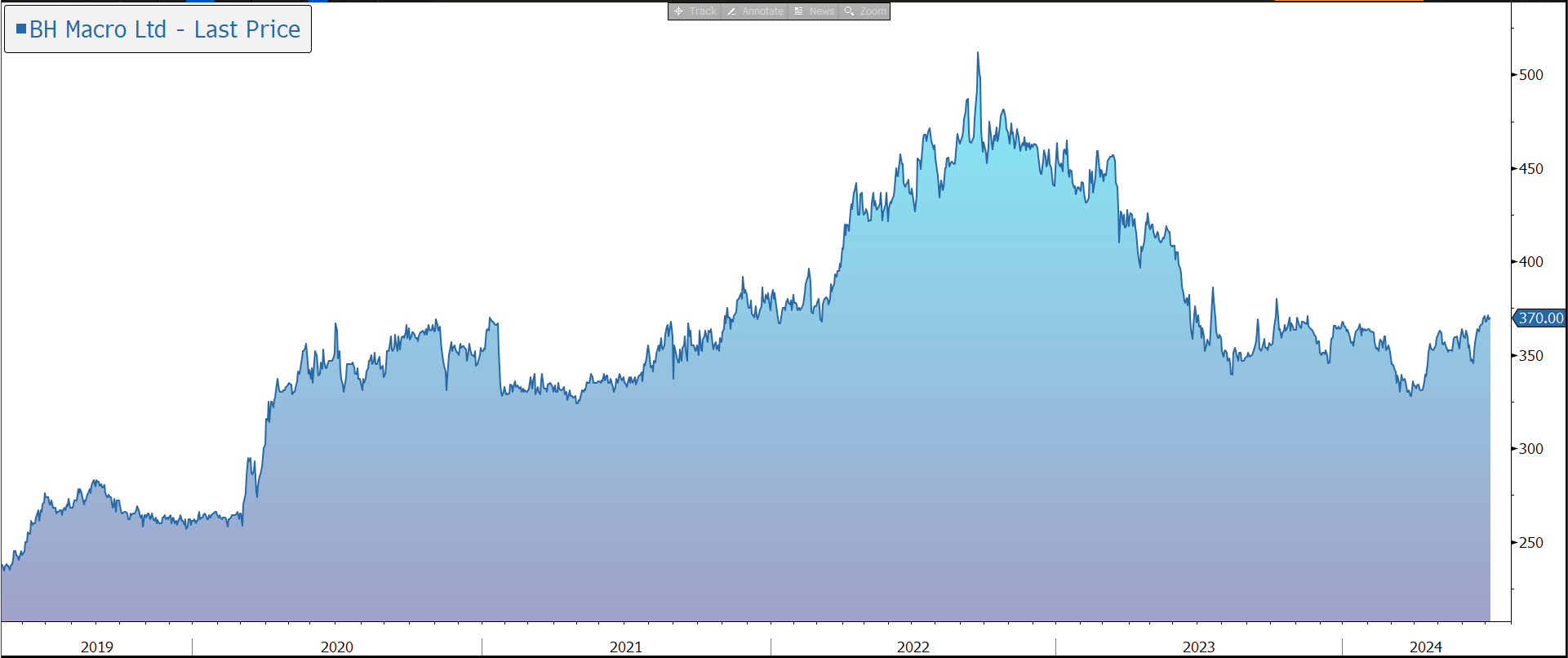Morning Note: Market news and an update on BH Macro.
Market News
Friday’s US economic data reinforced a dovish outlook on Federal Reserve monetary policy. Markets now see around a 76% chance of a Fed rate cut in September, with a second rate reduction in December also being priced in. The 10-year Treasury yield has fallen back to 4.30%, while gold rose and now trades at $2,380 an ounce. Investors now look ahead to key US inflation data this week, as well as fresh commentary from Fed officials to guide the rates outlook further.
France looks headed for political gridlock after a shock win by a left-wing coalition in yesterday’s election left no party able to claim a majority. Emmanuel Macron’s centrist alliance is set to place second, with Marine Le Pen’s National Rally — the widely expected winner — seen in third. French bond futures and the euro dipped after the vote spurred concerns about post-election finances, but European stock futures gained
This morning in Asia, markets were subdued: Nikkei 225 (-0.3%); Hang Seng (-1.7%); Shanghai Composite (-0.9%). The FTSE 100 is currently little changed at 8,192. Carlsberg and Britvic have reached agreement on the terms of a recommended cash offer at 1315p a share, implying an enterprise value of £4.1bn.
The UK’s new Chancellor Rachel Reeves will lay out the government’s plan to spur private investment in a speech today. She’s seen narrowing in on areas including green energy, housebuilding, and infrastructure. PM Starmer repeated a pledge to get defence spending up to 2.5% of GDP. Sterling currently trades at $1.2810 and €1.1830.
Source: Bloomberg
Fund Update – BH Macro
Diversification across asset classes is a critical element of managing your investments. At Patronus, when we construct a portfolio, we look to allocate a proportion of capital to so-called ‘anti-fragile’ investments that provide shelter in difficult times when other (‘fragile’) asset classes (such as equities and bonds) are struggling to a generate positive return. We believe BH Macro is one such investment.
BH Macro is a London-listed closed-ended investment company that invests substantially all its assets in the ordinary shares of Brevan Howard Master Fund. Following the 2021 merger with BH Global (Brevan Howard’s other listed investment strategy), a larger, more liquid, entity with the same investment policy was created. There are sterling and dollar classes available and total company assets currently stand at around £1.5bn. Fund fees are made up of a fixed component (management fee and operational services fee) of 2% and a 20% performance fee subject to a high water mark. In 2023, the annual fee fell from 6.11% to 2.16% due to the absence of performance fee.
The objective of the fund is to generate consistent long-term appreciation through active leveraged trading on a global basis. The strategies mainly focus on economic change, monetary policy, and market inefficiencies. Exposure is predominantly to global fixed income and currency markets, employing a combination of macro and relative value trading strategies. The fund seeks to achieve positive returns, uncorrelated with other markets and with low volatility. The underlying philosophy is to construct strategies, often contingent in nature, with superior risk/return profiles, whose outcome will often be crystallised by an expected event occurring within a pre-determined period of time.
The decision to hold the shares depends on whether the fund will provide capital protection during periods of market stress. In this regard, it has a good track record when equity markets are falling and has shown correlation with market volatility. Since inception in 2007 to the end of June 2024, in the 20 worst performing months for equities, BH Macro has produced 18 positive monthly returns. Over the same period, the annualised NAV return is 8.4%, with volatility (i.e., annualised standard deviation of returns) of 8%. Drawdowns have been significantly lower than other assets classes.
In 2020, the fund really proved its worth in the face of the challenges arising from Covid-19, with the NAV rising by 28% while the FTSE 100 fell by 11.6%. Again in 2022, when there was a marked pick-up in risk and volatility following Russia’s invasion of Ukraine, the fund generated another outstanding performance, rising by 22%, compared to an 8% decline in global equities in sterling terms and a 15% drawdown in UK bond markets. In 2023 (-1.8%) and in the first half of 2024 (-1.1%), the NAV has drifted lower.
In February 2023, and in response to persistent requests from its shareholders, the company placed £312m of new Sterling shares to increase the liquidity of the stock and spread the company’s fixed costs over a wider base. However, the move caused some indigestion and the shares moved from a 19% premium to a substantial 19% discount at its low point in March 2024.
The overhang was exacerbated by the merger of two of the company’s largest shareholders, Rathbones and Investec. Although The Takeover Panel has given clearance that the combined entity is not under any obligation to make sales of the stock, it has gradually reduced its holding – on 30 June 2024, it was 25%.
At the same time, BH Macro has started to buy back its shares, an accretive move given the discount. Since the programme was initiated in December 2023 (and up until 4 July 2024), the company has bought back 18.5m shares, just under 5% of the total. Last month, the company increased its Annual Buyback Allowance (ordinarily 5% of the shares) in respect of the current calendar year. Prior to the increase, the company had utilised 85% of its allowance for 2024. The company may, during the remainder of 2024, now repurchase a further 16.3m shares (4.56% of the shares in issue) without incurring the additional fees ordinarily payable to the manager under the Management Agreement. The buyback has had a positive impact on the size of the discount – moving from 19% to 8.5% at present – and the share price which is 14% above the March low point.
We remain very positive on the company given its portfolio diversification attributes at a time when the geopolitical and macro-economic outlook remain very uncertain and an extended period of calm like that between 2013-19 is very unlikely to be repeated. The company has previously commented that there are several factors that may drive the shift towards structurally higher interest rates and more economic volatility, all of which provide a rich opportunity set for macro trading. Furthermore, the current discount to NAV provides an added incentive to purchase the shares at this level.
Source: Bloomberg


